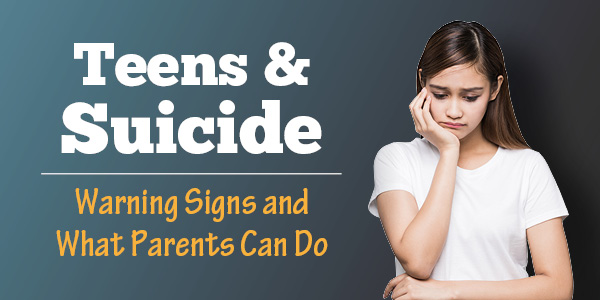Teens & Suicide
Warning Signs and What Parents Can Do
Suicide is the second-leading cause of death in teens nationwide and Kentucky, and the trend is only growing worse.
Based on a recent review of child fatality data, rates are increasing with spikes in suicide numbers among children ages 10-14.
According to a youth risk behavior survey in 2017, approximately 15% of high school students in Kentucky had seriously considered attempting suicide during the past 12 months. Males tend to be at a higher risk than females for suicide.
Adolescence is already a difficult time for many teens who are faced with high stress situations and may feel overwhelmed by social, emotional and academic pressures.
Many teens also engage in risk-taking behaviors such as experimenting with drugs, alcohol and sexual activity.
With the growing use of technology and the internet, teens are also exposed to online risks such as cyberbullying, inappropriate sexual content and soliciting.
There are various risk factors associated with teen suicide. While most teens may have a history of mental health issues, there may be more immediate risk factors such as agitation, intoxication or a recent stressful life event such as the end of a relationship or academic failure.
What Are the Risk Factors?
- A family history of suicide or suicide attempts
- Mental health problems in parents
- Personal traumatic life events such as physical or sexual abuse
- Mental health problems such as depression, bipolar disorder, substance use disorders, psychosis, post-traumatic stress disorder or an eating disorder
- History of non-suicidal self-harm injuries
- Teens with behavioral issues such as aggression or severe anger
- Teens who identify as lesbian, gay, bisexual, questioning or transgender
- Excessive internet use and exposure to media with suicidal content.
What Can Parents Do?
- Keep open, honest and constant communication with your teen. It is important to let your teenagers know that they can talk to you about anything and that you are committed to discussing all topics of concern without judgment. Let them know that they are not alone. Share your own experience as a teen.
- Supervise your teen’s use of technology and educate them about internet safety.
- Be attentive to your teen’s behavior. Abrupt, dramatic or severe changes in behavior can be strong indicators of serious mental health issues.
- Be aware of some of the red flags that could indicate a mental health issue: excessive sleeping beyond usual teenage fatigue, difficulty in falling asleep, loss of self-esteem or dramatic changes in performance at school.
- Seek immediate help when teens make statement such as “There is no point in going on;” “I can’t take it anymore;” “I just want to get over it;” or “I might kill myself.”
If you think your teen could be at risk for a suicide attempt, talk to your child’s doctor or reach out to a mental health professional. Organizations such as the National Suicide Prevention Lifeline provide resources on how to help someone who is at risk for suicide.
Additional Resources
- SAMHSA Mental Health Resources for Youth
- SAMHSA National Child Traumatic Stress Initiative
- www.healthychildren.org/English/family-life/Media/Pages/Dangerous-Internet-Challenges.aspx
Dr. Mandakini Sadhir is the Clinical Medical Director for the Adolescent Medicine and Young Parents Program at Kentucky Children’s Hospital.

